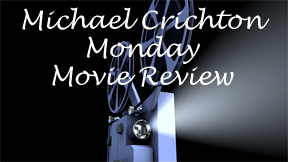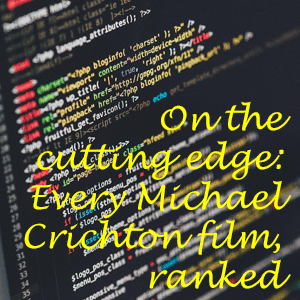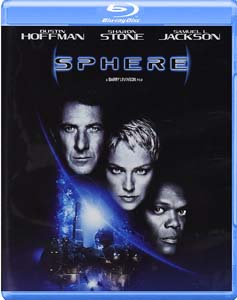It’s been more than 20 years now, so I guess “Sphere” (1998) won’t become a cult classic. But darn it, it should have. This Michael Crichton adaptation had little chance of being a mainstream hit upon release, as it offers something to tick off everyone: It’s too long (2 hours, 14 minutes) if the story doesn’t hook you, it’s too short if it does hook you, it’s too dependent on Crichton’s 1987 novel if you haven’t read it, and it diverts too much from the book if you’re a fan.
Goldenthal is golden
Even though I think a theoretical 3-hour cut of director Barry Levinson’s film would be a masterpiece, I am a “Sphere” apologist even given its actual state. Setting the story aside for a moment, the film is a work of art. Composer Elliot Goldenthal conjures wonder in the fashion of “2001” and “Contact” and fear in the nature of “The Abyss” and “Event Horizon” – both of which hit theaters first but post-date the “Sphere” novel.
Adam Greenberg’s underwater cinematography complements Goldenthal’s score with its own strange, dark beauty. And it’s clear this is an expensive movie, with a lot of the money going to the sets: a habitat for the explorers, and a huge spaceship of unknown origin that contains an alien sphere.

“Sphere” (1998)
Director: Barry Levinson
Writers: Stephen Hauser, Paul Attanasio (screenplay); Kurt Wimmer (adaptation); Michael Crichton (novel)
Stars: Dustin Hoffman, Sharon Stone, Samuel L. Jackson
Departures from the book
Writers Stephen Hauser and Paul Attanasio, working from an adaptation by Kurt Wimmer, are faithful to Crichton’s book in structure and characters.
The group of scientists and explorers are played by an all-star cast, including Dustin Hoffman as the steady psychiatrist, Sharon Stone as the jittery biologist, Samuel L. Jackson as the “20,000 Leagues Under the Sea”-obsessed mathematician, Liev Schreiber as the enthusiastic knowledge-seeker and Peter Coyote as the gruff Navy boss. Thanks to the sphere – and choppy editing that arguably doesn’t hurt this aspect of the film — all of them depart and return to their core characterizations, seemingly randomly.
“Sphere” diverges from Crichton in the details, particularly in the final act. While the notion of the sphere as something that gives people creature-manifesting powers remains, the movie places more emphasis on paranoia and mistrust between Norman (Hoffman), Beth (Stone) and Harry (Jackson) as it builds toward its grand statement that humans (even good ones) aren’t yet ready for superpowers.
Many film-only mysteries remain unanswered – for example, why does Beth think all the food is gone? And why does the sphere’s surface reflect everything except the people? But possible answers swirl around every question – some present in the text, some present in our imaginations.
Odd editing choices
As it stands, “Sphere” leans closer to a lazy weekend afternoon movie, but it’s so close to being a masterpiece. The divergent point is the editing, which must’ve been studio mandated. The film is cut like a found-footage movie in that it is jittery and leaves stuff out; it uses many title cards (as per the book) to indicate new chapters.

I’m curious if it would’ve been better if allowed to breathe, to try not so much to be a fast-paced crowd-pleaser but instead to be one of those indulgent works of sci-fi art that get celebrated for its indulgences.
“The Andromeda Strain” tried to be one of those films and failed. But “Sphere” has more going for it — partially because of tech advances, but also because it grasps at big, profound ideas that are ungraspable.
Trust no one
This is illustrated in particular by Hoffman, whose Norman clearly enters the sphere (the film, diverting from the book, centers the “Did she go into the sphere?” question on Beth) yet whose role in the events is nonetheless unclear. When Queen Latifah’s Fletcher (in a case of over-casting for a small part) is killed by a school of jellyfish, Norman sits there listening to her death throes as if it’s a boring day at the office.
So we want to trust the main character, but can’t quite. Everyone else – including the mysterious alien entity Jerry, who we know only from computer messaging — also messes with our desire to trust them in this tense situation. There’s no Alan Grant – or even a bland, reliable scientist like the quartet in “Andromeda” — to be found here.
“Sphere” has a fatalistic, end-of-the-world vibe – Harry deduces that they inevitably will die in order for the time paradox to untangle – even though we see hopeful, possibility-laden images such as the golden alien sphere, which can be entered in a magical fashion where the person blends into the surface.
Even without an indulgent, thoughtful edit, “Sphere” is the dark “2001,” not necessarily in its conclusion or overall theme (both films are about humanity’s tiny part in the cosmos), but rather in its journey. In every strange instance, Levinson’s film nudges us toward the negative interpretation, thanks largely to the visual and aural contributions from Greenberg and Goldenthal.
I can see why “Sphere” is disliked by many, but I’m surprised it’s not loved by more SF enthusiasts.

